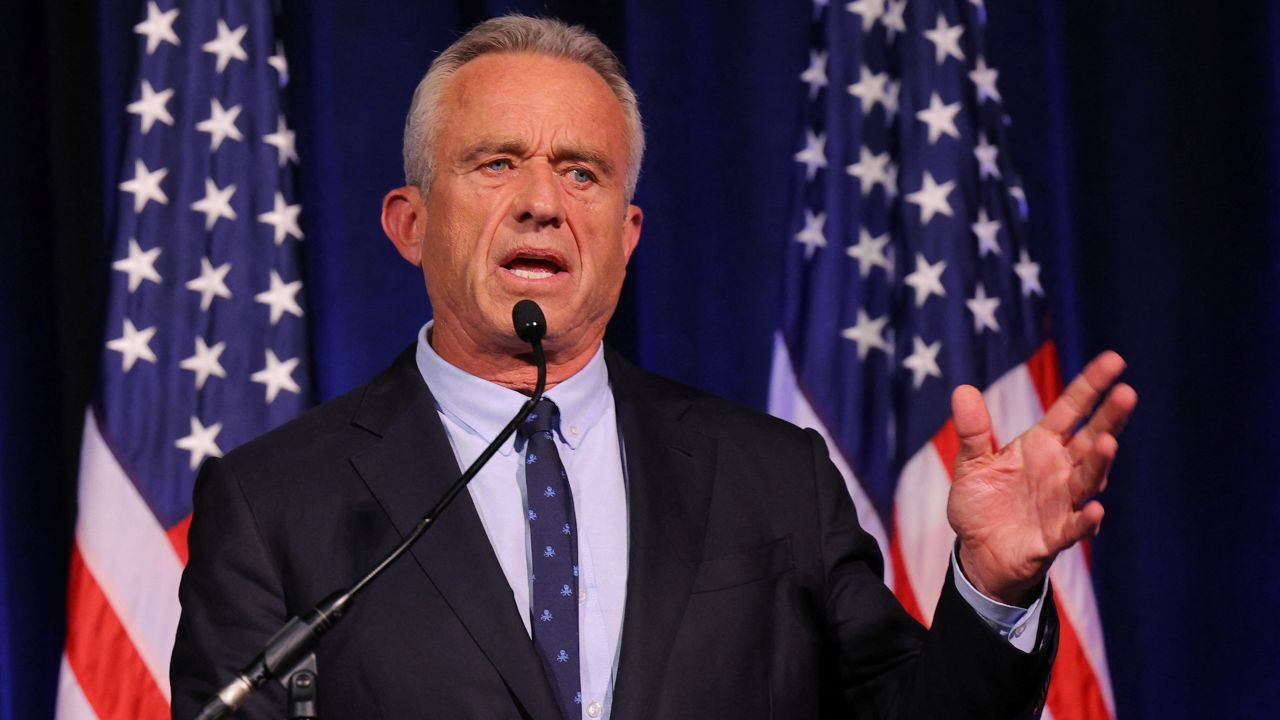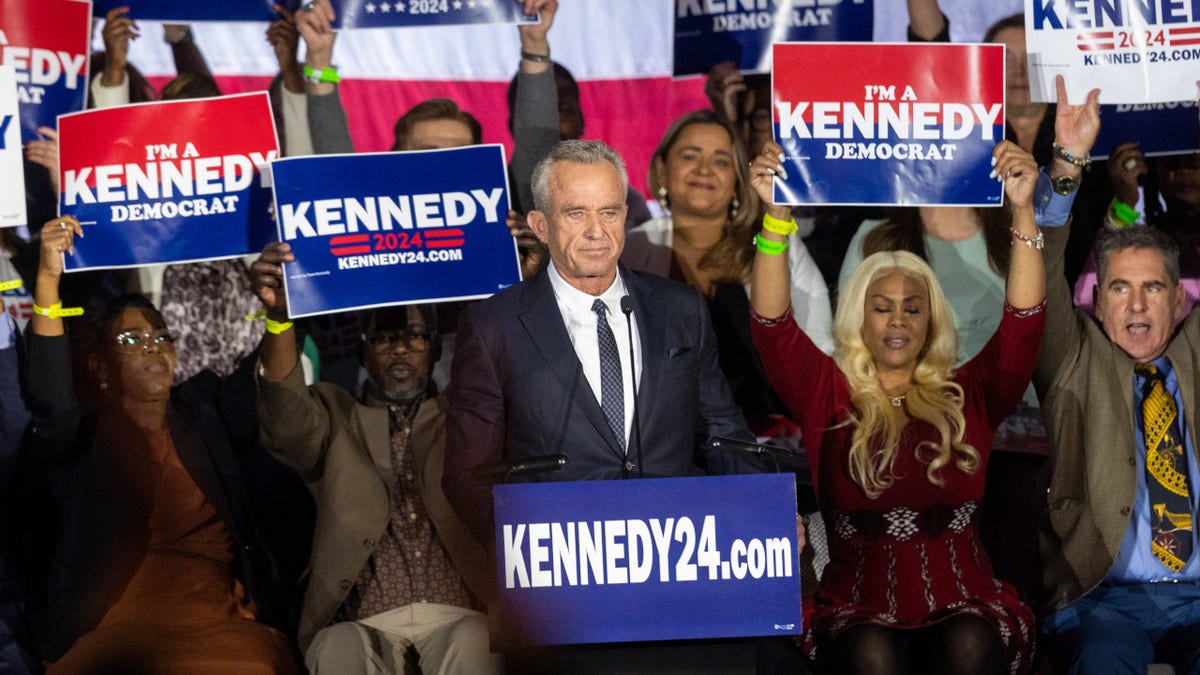Let’s be real here, folks. If you’ve been paying attention to the news or social media lately, you’ve probably come across some chatter about Robert F. Kennedy Jr.’s voice. It’s been the center of attention, sparking debates, memes, and even some serious discussions. So, what exactly is the deal with his voice? Is there something wrong, or is it just another internet sensation that people can’t seem to get enough of?
Now, before we dive headfirst into this topic, let’s set the stage. Robert F. Kennedy Jr., or RFK Jr. as he’s often called, is no stranger to controversy. Whether it’s his stance on vaccines, environmental issues, or his family legacy, the guy has always been a polarizing figure. But lately, it’s his voice that’s been grabbing all the headlines.
Why does his voice matter so much? Well, in today’s world, where opinions are formed in seconds based on soundbites and viral clips, the way someone speaks can shape how they’re perceived. And let’s face it—RFK Jr.’s voice has become a focal point for both criticism and curiosity. Let’s unpack this whole situation and find out what’s really going on.
Read also:Unveiling The Truth Mika Abdalla Nudes Controversy And Facts You Need To Know
Biography of Robert F. Kennedy Jr.
Before we get into the nitty-gritty of his voice, let’s take a moment to understand who Robert F. Kennedy Jr. really is. Born on February 17, 1954, in Washington, D.C., RFK Jr. is the third child of Robert F. Kennedy and Ethel Kennedy. His family name alone carries significant weight, given his father’s role as a prominent politician and civil rights advocate.
RFK Jr. is an environmental lawyer, author, and activist. Over the years, he’s been involved in numerous high-profile cases and movements aimed at protecting the environment. However, he’s also gained notoriety for his outspoken views on vaccines, which have sparked intense debates and even backlash from the medical community.
Here’s a quick snapshot of his personal and professional life:
| Full Name | Robert Francis Kennedy Jr. |
|---|---|
| Birth Date | February 17, 1954 |
| Profession | Environmental Lawyer, Author, Activist |
| Education | B.A. from Harvard College, J.D. from University of Virginia School of Law |
| Family | Son of Robert F. Kennedy and Ethel Kennedy; father of 6 children |
What’s the Big Deal About His Voice?
Alright, so now that we’ve got the background out of the way, let’s talk about the elephant in the room—his voice. Some people describe it as monotone, others say it’s robotic, and a few even claim it’s unsettling. But why does it have such a strong reaction?
For starters, RFK Jr.’s voice has a distinct quality that can be off-putting to some listeners. It’s often described as slow, deliberate, and lacking inflection. This can make it difficult for people to connect with him emotionally, especially when he’s discussing topics that are meant to stir up passion or urgency.
Let’s break it down further:
Read also:Sophie Rain Spiderman Video Oficial The Ultimate Fan Guide
- Monotone Delivery: His speech pattern tends to stay on the same pitch, which can make it sound like he’s reading from a script.
- Slow Pace: RFK Jr. speaks at a slower pace than most people, which can make his speeches feel drawn out.
- Lack of Emotion: There’s often a disconnect between the content of his messages and the way he delivers them, leading to confusion or skepticism among his audience.
Is There Something Medically Wrong?
Now, here’s where things get interesting. Some people have speculated that there might be a medical explanation for RFK Jr.’s voice. Conditions like Parkinson’s disease, vocal cord paralysis, or even anxiety can affect how someone speaks. However, without a formal diagnosis, it’s purely speculative.
That being said, it’s important to approach this topic with sensitivity. Accusing someone of having a medical condition based solely on their voice can be hurtful and unfair. Instead, let’s focus on the broader implications of how voice affects perception and communication.
Exploring Vocal Health and Its Impact
Vocal health plays a crucial role in how we communicate. Factors like stress, fatigue, and even environmental conditions can influence the way someone sounds. For RFK Jr., who spends a lot of time speaking in public, maintaining vocal health is essential.
Here are a few tips for anyone looking to improve their vocal clarity:
- Stay hydrated to keep your vocal cords lubricated.
- Avoid shouting or speaking loudly for extended periods.
- Practice deep breathing exercises to support your voice.
Why Does Voice Matter in Public Speaking?
In today’s world, public speaking is more than just delivering information—it’s about creating an emotional connection with your audience. A compelling voice can inspire trust, confidence, and action. On the flip side, a voice that lacks energy or emotion can leave listeners disengaged or even skeptical.
RFK Jr.’s voice has been criticized for not aligning with the passion and urgency of his messages. This disconnect can undermine his credibility, especially when he’s tackling controversial topics like vaccines or environmental issues.
The Science Behind Vocal Perception
Research shows that people form opinions about others based on how they sound. Studies have found that certain vocal qualities, like pitch, tone, and pace, can influence how trustworthy or competent someone appears. For example, a deeper voice is often associated with authority, while a higher-pitched voice may be seen as less confident.
So, what does this mean for RFK Jr.? It means that his voice could be working against him in some ways. But that doesn’t mean it’s a lost cause. With the right techniques and practice, anyone can improve their vocal delivery.
How Can RFK Jr. Improve His Voice?
If you’re wondering whether RFK Jr. can change his voice, the answer is yes. With the help of a vocal coach or speech therapist, he could work on improving his tone, pace, and emotional delivery. Here are a few strategies he might consider:
- Variety in Pitch: Adding more variation to his voice can make it more engaging and dynamic.
- Pausing for Effect: Strategic pauses can help emphasize key points and keep the audience’s attention.
- Emotional Connection: Learning to infuse his speeches with genuine emotion can help bridge the gap between his message and his audience.
Success Stories in Vocal Improvement
There are plenty of examples of public figures who’ve transformed their voices to better connect with their audiences. Take Barack Obama, for instance. Early in his career, his speeches were criticized for being too academic and lacking emotional resonance. But over time, he developed a more engaging speaking style that resonated with millions of people.
RFK Jr. could follow a similar path by investing time and effort into improving his vocal delivery. It won’t happen overnight, but with dedication, it’s definitely achievable.
Public Perception vs. Reality
Let’s talk about the elephant in the room—public perception. Whether we like it or not, how we sound can have a significant impact on how we’re perceived. RFK Jr.’s voice has become a lightning rod for criticism, but is it really fair?
On one hand, his vocal style may not be everyone’s cup of tea. But on the other hand, it’s important to recognize that his message is what truly matters. At the end of the day, his views on vaccines, the environment, and other issues are what define him as a public figure—not his voice.
The Role of Media in Shaping Perception
The media plays a huge role in shaping public perception. Soundbites, viral clips, and social media can amplify certain aspects of someone’s personality or behavior, sometimes out of context. In RFK Jr.’s case, his voice has become a focal point for both criticism and ridicule.
But is this fair? Or is it just another example of how the media can distort reality to create sensational headlines? It’s worth considering how much weight we place on someone’s voice compared to the substance of their message.
The Broader Implications
Finally, let’s zoom out and look at the bigger picture. The controversy surrounding RFK Jr.’s voice highlights a broader issue—how we judge people based on superficial qualities like appearance, speech, or mannerisms. In a world where first impressions matter more than ever, it’s easy to dismiss someone based on how they sound rather than what they have to say.
But here’s the thing: RFK Jr.’s voice doesn’t define him as a person. His ideas, actions, and contributions to society are what truly matter. So, instead of focusing on how he sounds, maybe we should focus on what he’s saying and whether it aligns with our values.
Encouraging Open Dialogue
Open dialogue is key to bridging the gap between perception and reality. By encouraging honest conversations about voice, communication, and public perception, we can create a more inclusive and understanding society.
So, the next time you hear someone criticize RFK Jr.’s voice, take a moment to reflect. Is it really about his voice, or is it about something deeper? By asking these questions, we can move beyond surface-level judgments and engage in meaningful discussions about the issues that matter most.
Conclusion: What’s the Takeaway?
To wrap things up, let’s recap what we’ve learned. Robert F. Kennedy Jr.’s voice has become a hot topic of discussion, sparking both criticism and curiosity. While some people find it off-putting, others see it as just another quirk of a complex and multifaceted individual.
At the end of the day, it’s important to remember that voice is just one aspect of communication. What truly matters is the substance of someone’s message and how it aligns with our values. So, instead of fixating on how RFK Jr. sounds, let’s focus on what he has to say and whether it resonates with us.
And hey, if you’ve made it this far, congrats! You’ve now got a deeper understanding of the controversy surrounding RFK Jr.’s voice. Now it’s your turn to weigh in. Do you think his voice is a problem, or is it just another internet sensation? Let us know in the comments below, and don’t forget to share this article with your friends!
Table of Contents

